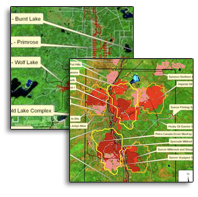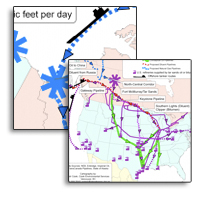Tar Sands 101
The Tar Sands "Gigaproject" is the largest industrial project in human history and likely also the most destructive. The tar sands mining procedure releases at least three times the CO2 emissions as regular oil production and is slated to become the single largest industrial contributor in North America to Climate Change.
The tar sands are already slated to be the cause of up to the second fastest rate of deforestation on the planet behind the Amazon Rainforest Basin. Currently approved projects will see 3 million barrels of tar sands mock crude produced daily by 2018; for each barrel of oil up to as high as five barrels of water are used.
Human health in many communities has seriously taken a turn for the worse with many causes alleged to be from tar sands production. Tar sands production has led to many serious social issues throughout Alberta, from housing crises to the vast expansion of temporary foreign worker programs that racialize and exploit so-called non-citizens. Infrastructure from pipelines to refineries to super tanker oil traffic on the seas crosses the continent in all directions to allthree major oceans and the Gulf of Mexico.
The mock oil produced primarily is consumed in the United States and helps to subsidize continued wars of aggression against other oil producing nations such as Iraq, Venezuela and Iran.
To understand the tar sands in more depth, continue to our Tar Sands 101 reading list
Sask. Ass. of Pipeline Landowners addresses Enbridge, Recent Spill
Pipeline oil spill raises questions among residents
Angela Hall, The Leader-Post
Published: Saturday, April 21, 2007
http://www.canada.com/reginaleaderpost/news/business_agriculture/story.h...
Even before an oil spill was detected near Glenavon last weekend, some area residents had questions about the underground pipelines that snake through their land.
Days before the spill from an Enbridge line on Sunday, the newly formed Saskatchewan Association of Pipeline Landowners had already scheduled Wednesday's meeting in Glenavon.
The Human Right to Water and Indigenous Peoples
"Water is Life"
The Human Right to Water and Indigenous Peoples
Submission to the United Nations High Commissioner on Human Rights by the
International Indian Treaty Council, NGO in Special Consultative Status to the UN
Economic and Social Council
April 13, 2007
I. INTRODUCTION
The International Indian Treaty Council is pleased to respond to the High
Commissioner's invitation to submit information relevant to the Council on Human
Rights' requested study on the human right to water. We thank the High Commissioner
The On-Going Carbon Age
THE ONGOING CARBON AGE
BY DANIEL CASEY
APRIL 20, 2007
http://maisonneuve.org/index.php?&page_id=12&article_id=2714
Mining Journal: Breakdown of Companies and Projects
Growing for black gold
http://www.canadianminingjournal.com/issues/ISarticle.asp?id=185949&stor...
By: Marilyn Scales
Price tag for all oil sands projects nears $100 billion
Canada's oil sands are the world's largest single petroleum resource, nearly 1.7 trillion barrels. Most of this country's recoverable reserves (175 billion out of 180 billion bbl) are found in the Athabasca oil sands.
"Keystone pipeline will suck jobs, oil from Canada"-- Alberta Fed of Labour
Keystone pipeline will suck jobs, oil from Canada, AFL warns
Shaun Polczer, CanWest News Service; Calgary Herald
http://www.canada.com/vancouversun/story.html?id=9a3a1fcc-9278-40b9-9032...
April 17, 2007
CALGARY - The head of the Alberta Federation of Labour (AFL) says TransCanada Corp.'s proposed Keystone pipeline to the U.S. is a "job killer" that needs to be stopped.
Climate Change to Create Unparalleled Economic Depression: Suzuki
Unchecked global warming would spawn unparalleled depression, Suzuki warns
http://www.brooksbulletin.com/news/national_news.asp?itemid=62139
DENNIS BUECKERT
Friday, April 20, 2007
OTTAWA (CP) - David Suzuki says Canadians are ready to pay for fighting climate change so long as it's fair.
After a cross-country tour in which he heard from thousands of people in more than 40 cities, the veteran broadcaster and author says Canadians are ready for a carbon tax that would penalize wasteful use of energy and reward efficiency.
National Post on Peak Oil and the Tar Sands
FYI for the non-Canadian located reader: The National Post is Canada's ultra right wing newspaper.
--M
Sands are shifting for oil supply
Expert says we should be ready for big jump in price
Diane Francis, Financial Post
Published: Saturday, April 21, 2007
http://www.canada.com/nationalpost/financialpost/story.html?id=b9a3434b-...
The world continues to run rapidly out of oil and natural gas, which points to dramatically higher prices in a handful of years.
Eco-Apartheid: Why is the green movement so lily white?
Eco-Apartheid: Why is the green movement so lily white?
http://www.commongroundmag.com/2007/04/eco-apartheid0704.html
By Van Jones // April 2007, common ground
In 2005, Americans sat before our television sets, horrified by images of an
American city underwater. In 2006, we sat in the nation's movie houses,
watching Al Gore make the case for urgent action. In 2007, Americans are
finally rising from our seats and demanding action to reverse global
warming.
Students are planning marches and protests to push Congress to curb
TransCanada Keystone Pipeline from Edmonton Vs. Chaplin Nature Centre, Kansas
Proposal alarms Chaplin
http://www.arkcity.net/stories/041607/com_0002.shtml
Oil pipeline officials may adjust their route
By FOSS FARRAR
Traveler Staff Writer
The Chaplin Nature Center west of Arkansas City may be harmed by an oil pipeline from Canada that would run through its property, a nature center manager said today.
Shawn Silliman, the center's naturalist, said a flag planted on the south side of the 230-acre Chaplin center property indicates that the pipeline would run through the property.
Tar Sands slowly Expanding into northwest Saskatchewan
Oilpatch eyes neighbour
Bitumen find in Saskatchewan could spawn new industry
Claudia Cattaneo, Financial Post
http://www.canada.com/nationalpost/financialpost/story.html?id=e108138b-...
Published: Tuesday, April 17, 2007
By oil sands measures, the core sample plucked from 200 metres below a spindly Jack-pine forest last month was a beauty. Saturated with bitumen, the brownish, one-metre cut, part of a 20-metre oil sands zone, smelled like fresh asphalt. The sand was as warm and homogenous as that of a Caribbean beach.



